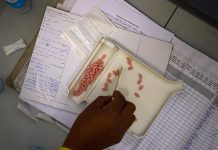Africa-Press – Tanzania. ROKOSAN, a Slovakian producer of organic and organo-mineral fertilizers, has begun a feasibility study for a new production facility in the country worth 40 million Euros (about 97.8bn/-).
The new factory that will be Rokosan’s second unit outside of its home country, seeks to transform organic fertilizer production by utilizing animal wastes such as poultry feathers, cattle hooves, and horns.
The facility to be built in the Coast region is the outcome of 37 Memorandums of Understanding (MOUs) inked during the Tanzanian Business Forum two months ago as part of the Dubai Expo 2020 witnessed by President SamiaSuluhu Hassan.
Rokosan Tanzania plant is expected to have an annual production capacity of 20 million litres of organic fertilizer.
Rokosan Country Representative,Dr Victoria Kisyombe, speaking at a Slovak-Tanzanian Climagoforum in Dar es Salaam yesterday, said the company, which is partnering with two local companies, Selfina and Kom, will start construction of the factory by the end of 2022 and expects it to be completed in two years.
DrKisyombe, who is also the Director of Selfina, expressed her delight at the opportunity to partner with the company as a result of President Samia’s tours outside of Tanzania.
“These investors are bringing in a large organic fertilizer factory, and we will employ 150 people at first, and when the factory is finished, 1,000 Tanzanians will have direct employment, and millions of Tanzanians will have indirect employment by supplying the factory with raw materials,” she said.
According to her, the company will also collaborate with Sokoine University of Agriculture (SUA) and Tanzania Agricultural Research Institute (TARI) to help women, who makeup half of the agriculture workforce, gain access to skill development and training that will enable them to adopt more environmentally friendly practices.
Another area where farmers will be trained is to transition from subsistence to commercial agriculture, she said.
Rokosan would have collecting and distribution centres in Tanzania’s 26 regions, according to DrKisyombe.
Ambassador James Bwana. representing Permanent Secretary Ministry of Foreign Affairs Ambassador Joseph Sokoine to officiate the meeting he said the factory was an important opportunity and will be of great benefit to the nation.
“The company is cooperating with local investors to develop organic fertilizers, which is crucial because one of the requirements for the items we export has traditionally been that they should be cultivated using organic fertilizers,” he explained.
DrJescaNkwabi, CEO of the Kom group of companies, expressed her delight at being a part of the factory that would implement the Rokosan movement, which is in line with the government’s 10/30 initiative, which aims to increase agro production in Tanzania by 10 per cent.
“The investment is timely given that the global organic food market is expected to grow at a Compound annual growth rate (CAGR) of 16 per cent to reach around 620 billion US Dollars by 2026, an increase from 220 billion US Dollars in 2019,” she said
She said modern organic farming was developed as a response to the environmental harm caused by the use of chemical pesticides and synthetic fertilizers.
Dr Stephan Ngailo, the Executive Director of the Tanzania Fertilizer Regulatory Authority (TFRA), their role is to encourage investors in the fertilizer industry and to control the quality of fertilizers produced locally and internationally.
“There is another fertiliser factory in Dodoma – Itracom fertilizer- that will make granule fertilizer, with an initial capacity of 600,000 tons and the potential to expand to 150,000 tons; this Rokosan factory will make liquid fertilizer, with an initial capacity of 20 million litres,” DrNgailo stated.
According to DrNgailo, the country’s fertilizer requirement is 700,000 tons, although this demand appears to be small due to fertilizer prices, therefore many farmers do not use fertilizer.
“I believe if the price goes down due to increased production then demand and fertilizer uptake will increase,” he explained.
For More News And Analysis About Tanzania Follow Africa-Press







